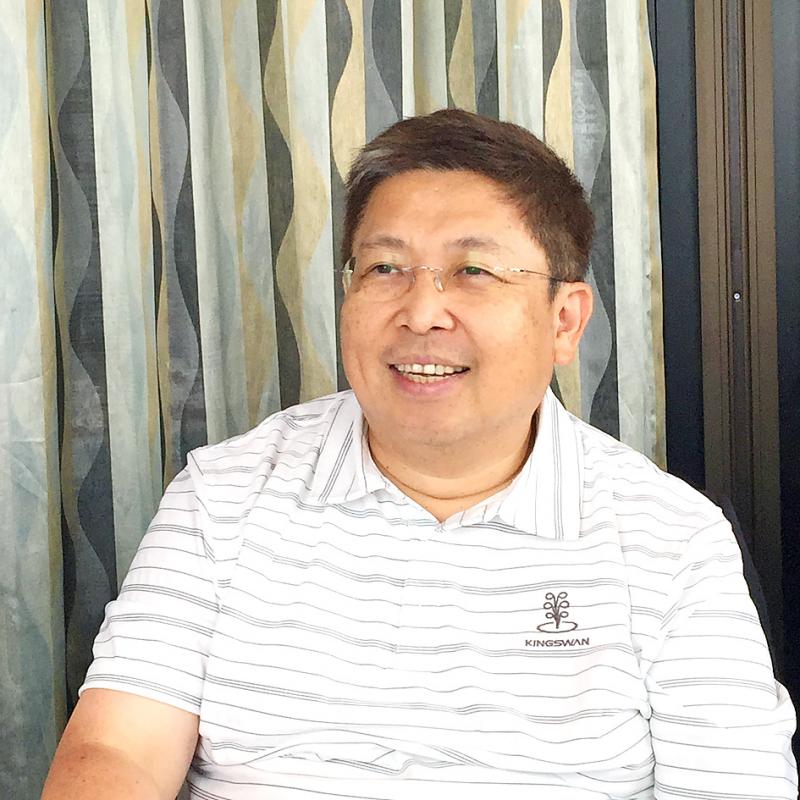Adata Technology Co (威剛), a supplier of memory modules and solid-state drives (SSDs), yesterday posted its best quarterly net profit in 14 quarters on the back of rising prices.
During the three-month quarter to March, net profit surged 57.18 percent to NT$707 million (US$25.27 million), from NT$450 million last year. On a quarterly basis, net profit more than doubled from NT$317 million.
Earnings per share rose to NT$2.94, compared with NT$2.12 a year earlier and NT$1.41 in the previous quarter.

Photo: Grace Hung, Taipei Times
The company said that the first quarter was exceptionally strong, bucking a seasonal downtrend, adding that prices for DRAM products extended a pickup in the final quarter of last year, while those of NAND flash products began increasing faster than expected.
That helped the company’s gross margin improve to 19.07 percent last quarter from 12.44 percent a year earlier, but it was lower than the previous quarter’s 23.56 percent.
Adata is bullish about the company’s business performance for the rest of this year, as the memory industry is entering a new epicycle, and expects robust demand to continue driving prices of DRAM and NAND flash products higher in the coming quarters, the company said in a statement.
“As the world’s major suppliers from South Korea and the US expect a supply shortage this year, Adata has built up inventory of memory chips and SSD controllers to cope with rising demand,” chairman Simon Chen (陳立白) said in the statement.
Adada had accumulated key components worth NT$10 billion as of the end of last quarter, a record high, the statement said.
“Demand for PCs, servers and mobile phones is expected to continue to show strong momentum in the second and third quarters. Demand from the automotive segment is also expected to grow,” Chen said. “As DRAM supply constraints worsen in the second quarter, price hikes would be more drastic than in the first quarter.”
A cryptocurrency mining boom is also stimulating demand for high-density SSD products, which is to further lift NAND flash product prices, Chen said.
Adata orders for SSDs soared four to fivefold last month, compared with orders received in March, benefiting from increased mining of Chia, a new cryptocurrency, the company said.
The board of directors yesterday approved investing NT$797 million in real estate in Taipei’s Neihu District (內湖), following an investment of NT$2.63 billion in the same apartment complex and parking lots last month.

SEMICONDUCTORS: The German laser and plasma generator company will expand its local services as its specialized offerings support Taiwan’s semiconductor industries Trumpf SE + Co KG, a global leader in supplying laser technology and plasma generators used in chip production, is expanding its investments in Taiwan in an effort to deeply integrate into the global semiconductor supply chain in the pursuit of growth. The company, headquartered in Ditzingen, Germany, has invested significantly in a newly inaugurated regional technical center for plasma generators in Taoyuan, its latest expansion in Taiwan after being engaged in various industries for more than 25 years. The center, the first of its kind Trumpf built outside Germany, aims to serve customers from Taiwan, Japan, Southeast Asia and South Korea,

Gasoline and diesel prices at domestic fuel stations are to fall NT$0.2 per liter this week, down for a second consecutive week, CPC Corp, Taiwan (台灣中油) and Formosa Petrochemical Corp (台塑石化) announced yesterday. Effective today, gasoline prices at CPC and Formosa stations are to drop to NT$26.4, NT$27.9 and NT$29.9 per liter for 92, 95 and 98-octane unleaded gasoline respectively, the companies said in separate statements. The price of premium diesel is to fall to NT$24.8 per liter at CPC stations and NT$24.6 at Formosa pumps, they said. The price adjustments came even as international crude oil prices rose last week, as traders

Taiwan Semiconductor Manufacturing Co (TSMC, 台積電), which supplies advanced chips to Nvidia Corp and Apple Inc, yesterday reported NT$1.046 trillion (US$33.1 billion) in revenue for last quarter, driven by constantly strong demand for artificial intelligence (AI) chips, falling in the upper end of its forecast. Based on TSMC’s financial guidance, revenue would expand about 22 percent sequentially to the range from US$32.2 billion to US$33.4 billion during the final quarter of 2024, it told investors in October last year. Last year in total, revenue jumped 31.61 percent to NT$3.81 trillion, compared with NT$2.89 trillion generated in the year before, according to

PRECEDENTED TIMES: In news that surely does not shock, AI and tech exports drove a banner for exports last year as Taiwan’s economic growth experienced a flood tide Taiwan’s exports delivered a blockbuster finish to last year with last month’s shipments rising at the second-highest pace on record as demand for artificial intelligence (AI) hardware and advanced computing remained strong, the Ministry of Finance said yesterday. Exports surged 43.4 percent from a year earlier to US$62.48 billion last month, extending growth to 26 consecutive months. Imports climbed 14.9 percent to US$43.04 billion, the second-highest monthly level historically, resulting in a trade surplus of US$19.43 billion — more than double that of the year before. Department of Statistics Director-General Beatrice Tsai (蔡美娜) described the performance as “surprisingly outstanding,” forecasting export growth